FDPRI Research, Reports and Resources
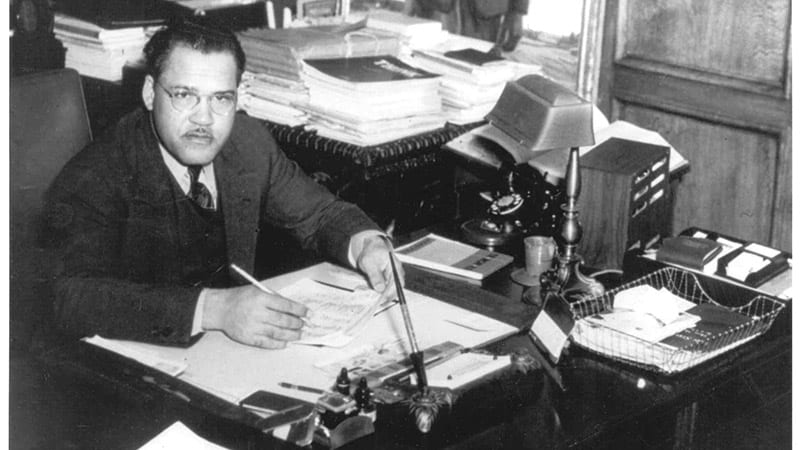
Frederick D. Patterson
Here are the Frederick D. Patterson Research Institute’s most recent reports, which you can download.
UNCF Annual Report
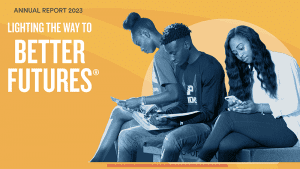
UNCF: Lighting the Way to Better Futures
Putting students on the path to graduation. The secret behind the success of UNCF’s 37 member colleges and universities and their students. Bringing communities together for education. Closing the national college achievement gap. Advocating for K-12 education. UNCF and America’s mayors. The power of an individual’s investment. These are just some of the highlights featured in Lighting the Way to Better Futures, UNCF’s most recent annual report.
Frederick D. Patterson Institute (FDPRI)
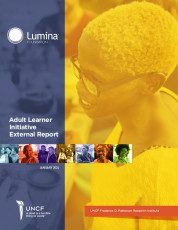 HBCU Adult Learner Initiative External Report (2024)
HBCU Adult Learner Initiative External Report (2024)
In this evaluation report, we’re delving into the unique challenges and successes of Black adult learners within HBCUs. Together with Lumina Foundation, we’re uncovering best practices for faculty, staff, and students of the five HBCUs participating in Lumina Foundation’s HBCU Adult Learner Initiative grant.
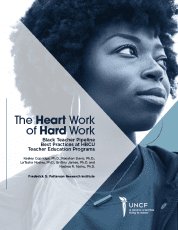 The Heart Work of Hard Work: Black Teacher Pipeline Best Practices at HBCU Teacher Education Programs (2024)
The Heart Work of Hard Work: Black Teacher Pipeline Best Practices at HBCU Teacher Education Programs (2024)
This report provides insight into the recruitment, curricular, and co-curricular best practices used at four HBCU teacher education programs that result in the recruitment, retention, certification, and graduation of Black teachers. Findings from this report will assist in strengthening the Black teacher pipeline.
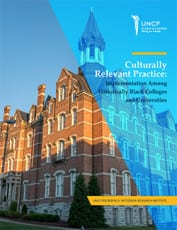
Culturally Relevant Practice: Implementation among Historically Black Colleges & Universities (2022)
This report addresses why UNCF is especially equipped to support HBCUs and institutions focused on increasing Black student success; and why UNCF is an expert in equity.
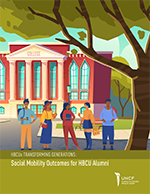 HBCUs Transforming Generations: Social Mobility Outcomes (2021)
HBCUs Transforming Generations: Social Mobility Outcomes (2021)
Despite offering admission to a significant number of underserved students, HBCUs are remarkably successful at supporting social mobility among their students.
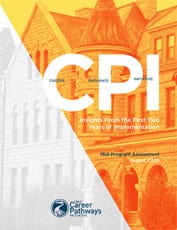 CPI Mid-Term Assessment: Insights From the First Two Years of Implementation (2020)
CPI Mid-Term Assessment: Insights From the First Two Years of Implementation (2020)
The assessment covers the first two years of program implementation, and provides insights from three critical components: program overview, early outcomes and institutional highlights.
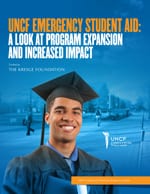
UNCF Emergency Student Aid: A Look at Program Expansion and Increased Impact
The primary study goal is to gain an in-depth understanding of emergency aid efforts and programs on UNCF-member HBCU campuses, including the UNCF-led Campaign for Emergency Student Aid (CESA), and their effectiveness to improve student outcomes and increase graduation rates.
 HBCUs Punching Above Their Weight (2019)
HBCUs Punching Above Their Weight (2019)
In their most important function—enrolling and graduating college students—HBCUs perform far better than their sizes and resources would lead one to expect.
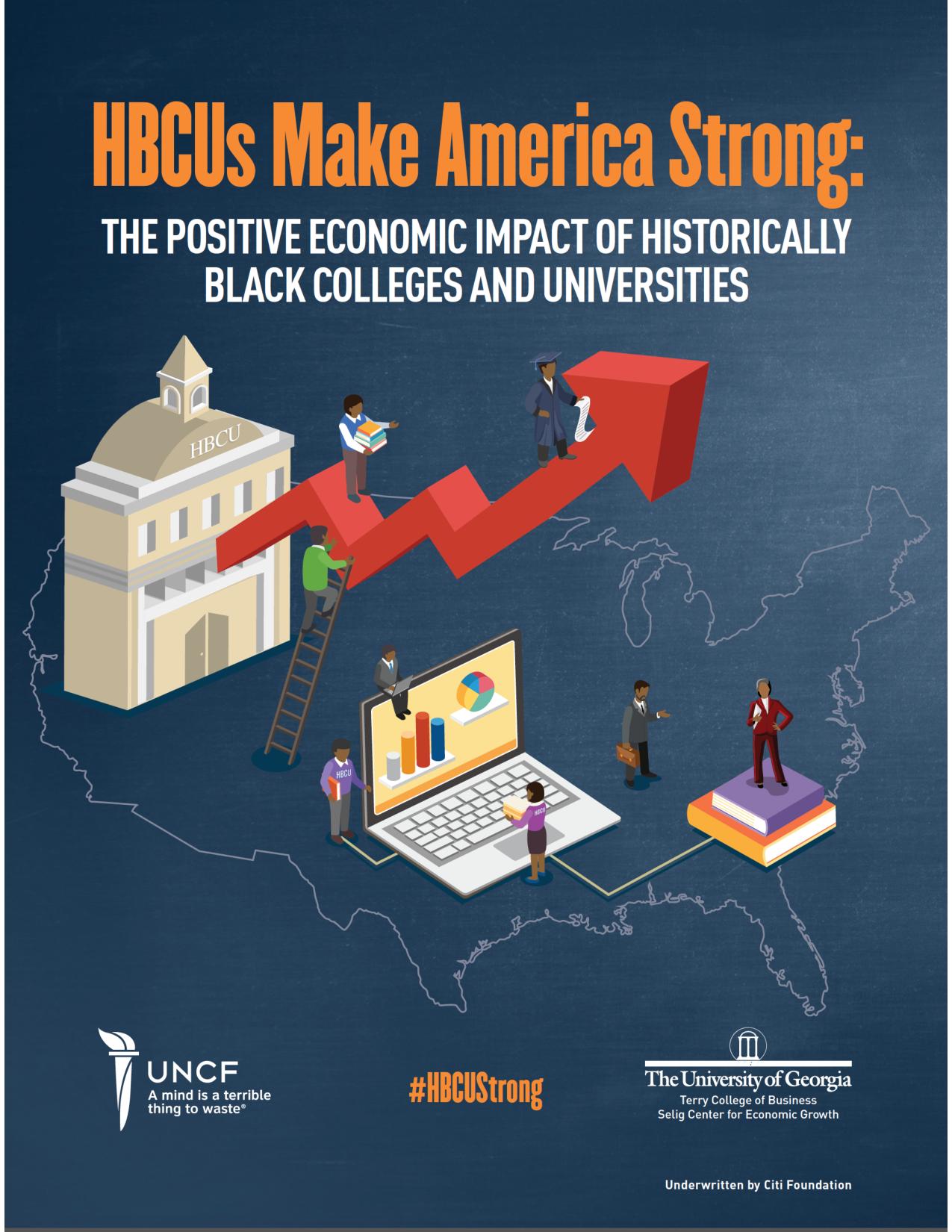 HBCUs Make America Strong: The Positive Economic Impact of Historically Black Colleges and Universities (2017)
HBCUs Make America Strong: The Positive Economic Impact of Historically Black Colleges and Universities (2017)
The landmark study, commissioned by UNCF’s Frederick D. Patterson Research Institute, shows that the economic benefits of HBCUs extend beyond the students they educate. They’re equally important to the regions and communities that HBCUs have served for more than 100 years.
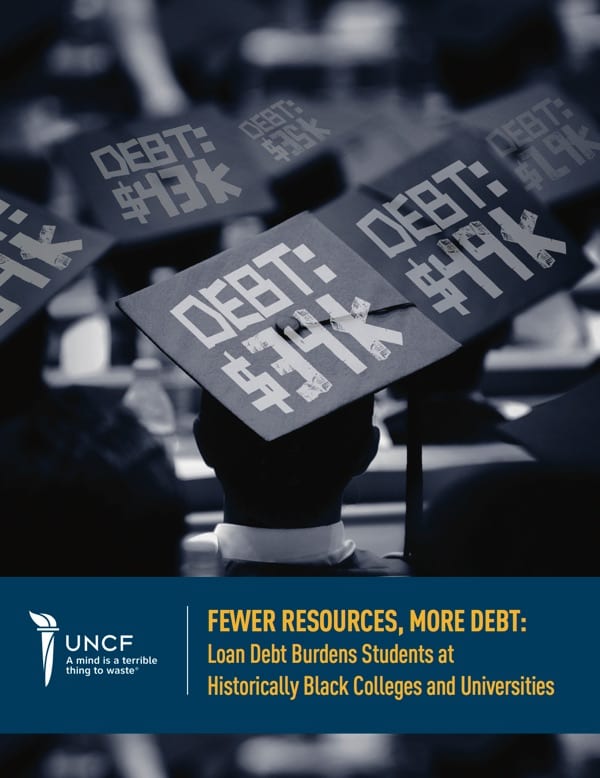 Fewer Resources, More Debt: Loan Debt Burdens Students at Historically Black Colleges and Universities (2016)
Fewer Resources, More Debt: Loan Debt Burdens Students at Historically Black Colleges and Universities (2016)
This report examines the rates, amounts and distribution of student loan debt among HBCU students relative to their non-HBCU peers and offers analysis that focuses solely on undergraduates attending four-year public and private, non-profit institutions.
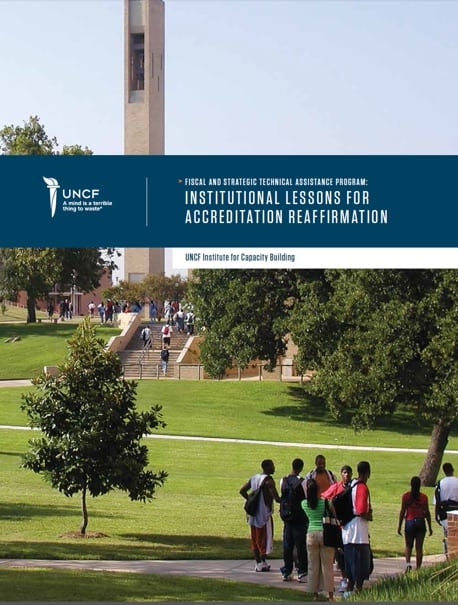 Fiscal and Strategic Technical Assistance Program: Institutional Lessons for Accreditation Reaffirmation (2016)
Fiscal and Strategic Technical Assistance Program: Institutional Lessons for Accreditation Reaffirmation (2016)
Programs that provide technical assistance and financial support during the reaffirmation process are instrumental in sustaining institutional compliance, especially for HBCUs and other minority-serving institutions. This report shares key lessons and best practices to better inform the accreditation efforts of low-resource institutions.
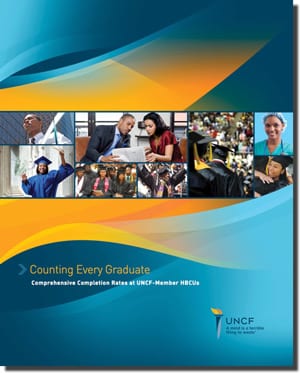
Counting Every Graduate: Comprehensive Completion Rates at UNCF-Member HBCUs (2015)
FDPRI collaborated with the National Student Clearinghouse Research Center to conduct a study to examine graduation rates using more comprehensive data than what is used in current calculations. Specifically, this analysis examined 19 four-year private UNCF-member, baccalaureate-level HBCUs.
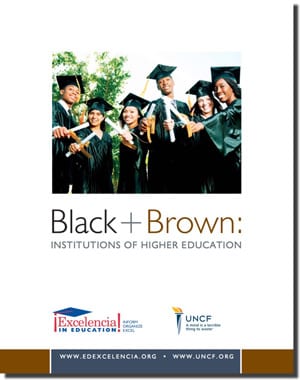 Black + Brown: Institutions of Higher Education (2014)
Black + Brown: Institutions of Higher Education (2014)
Historically black colleges and universities (HBCUs) and Hispanic-serving institutions (HSIs) represent a small percentage of all institutions in the U.S. but educate a large portion of all black and Latino students, many of whom are low-income and first-generation college attendees. Given the population growth of these students overall, both HBCUs and HSIs are in a distinct position to help move the country’s college completion agenda forward.
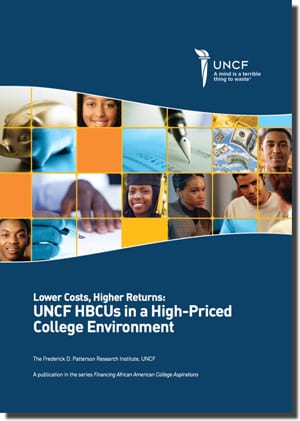
Lower Costs, Higher Returns: UNCF HBCUs in a High-Priced College Environment (2014)
While research consistently shows the earning power of college degrees, those returns are best weighed against the cost of attending post-secondary institutions, HBCUs included.
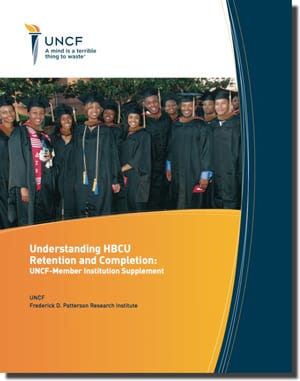 Understanding HBCU Retention and Completion: UNCF-Member Institution Supplement (2014)
Understanding HBCU Retention and Completion: UNCF-Member Institution Supplement (2014)
Our 2012 FDPRI report found that when students’ economic status and academic preparedness are controlled for, HBCUs retain and graduate African American students at higher rates than non-HBCUs. This 2014 supplement to that report narrows the focus to UNCF’s member institutions and shows that these private HBCUs retain and graduate students at rates competitive with other post-secondary institutions.
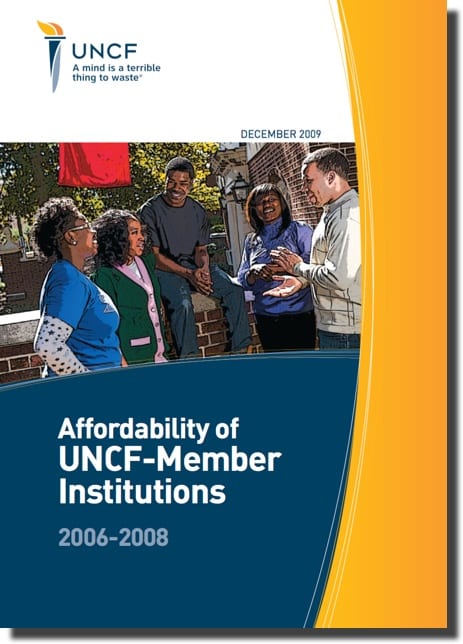 Affordability of UNCF-Member Institutions (2013)
Affordability of UNCF-Member Institutions (2013)
The 2009 FDPRI report revealed that total charges at UNCF’s member institutions were lower than at comparable institutions. This 2013 updated report shows that UNCF’s member institutions cost on average 26 percent less than comparable institutions in the 2012-2013 academic year. UNCF’s member institutions remain an affordable, private post-secondary option.
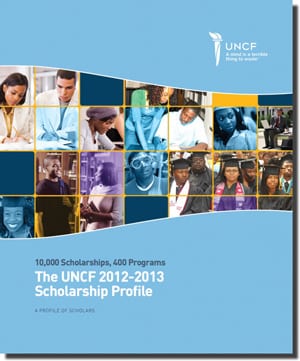 10,000 Scholarships, 400 Programs: The UNCF 2012-2013 Scholarship Profile (2012-2013)
10,000 Scholarships, 400 Programs: The UNCF 2012-2013 Scholarship Profile (2012-2013)
Each year UNCF awards well over 10,000 scholarships, fellowships and internships through 400 programs. These programs are supported through investments—by corporations, foundations, families and individuals—in the futures of the students who receive the scholarships, fellowships and internships.
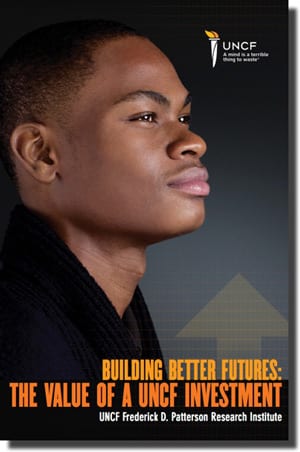 Building Better Futures: The Value of a UNCF Investment (2013)
Building Better Futures: The Value of a UNCF Investment (2013)
This report documents the impact of UNCF’s scholarships by analyzing the effect of award dollars on African American scholarship recipients’ likelihood of graduating. The study confirms that students who receive UNCF scholarship dollars are more likely to be retained for their second year and later graduate at higher rates than the national profile of African American college students.
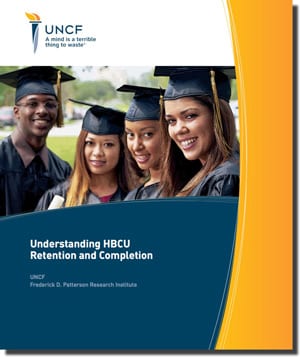 Understanding HBCU Retention and Completion (2012)
Understanding HBCU Retention and Completion (2012)
This report illustrates that when the impact of student level factors (academic preparedness and socioeconomic status) is taken into account, HBCUs often do a better job of retaining and graduating students than other institutions that enroll similar populations.
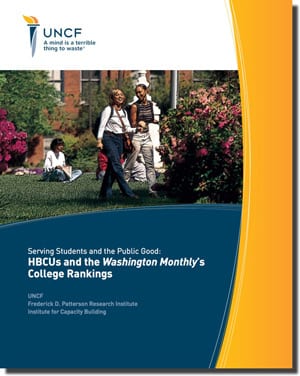 Serving Students and the Public Good: HBCUs and the Washington Monthly’s College Rankings (2012)
Serving Students and the Public Good: HBCUs and the Washington Monthly’s College Rankings (2012)
Using the Washington Monthly‘s College Rankings as source data, this report demonstrates the contributions of HBCUs to the social mobility of disadvantaged students by disproportionately helping them earn college degrees.
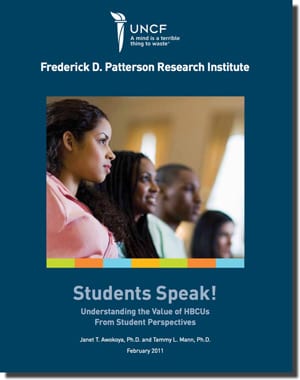 Students Speak! Understanding the Value of HBCUs From Student Perspectives (2011)
Students Speak! Understanding the Value of HBCUs From Student Perspectives (2011)
The report provides a window into what students who are currently attending private HBCUs have to say about why they chose their respective institutions and what they have valued most about their experiences on these campuses. As higher education institutions continue to grapple with the challenge of demonstrating their value in the face of increased pressure to attract, support, and graduate their students, it is important to understand student perspectives; that is, what students themselves say they value in institutions of higher learning.
K-12 Advocacy
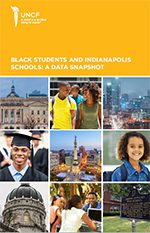 Black Students and Indianapolis Schools: A Data Snapshot (2022)
Black Students and Indianapolis Schools: A Data Snapshot (2022)
Marion County is the largest county in Indiana and serves the highest percentage of Black students in the state, however, Black students are less likely than White students to meet early college success criteria or even enroll in college at all. The data below show a brief snapshot of the landscape in Marion County for Black students and in some instances, Indiana overall.
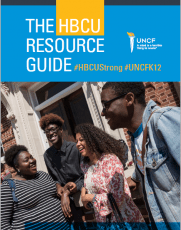 The HBCU Resource Guide (2022)
The HBCU Resource Guide (2022)
The guide is designed to assist in learning more about historically Black colleges and universities (HBCUs). This document provides information on scholarships, college- planning databases and key facts about HBCUs.
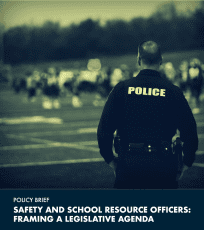 Safety and School Resource Officers: Framing a Legislative Agenda (2020)
Safety and School Resource Officers: Framing a Legislative Agenda (2020)
This joint brief with Howard University proposes tangible legislative actions that can occur at federal, state, and local levels to address school safety and school resource officers (SROs). The brief provides 7 key recommendations to address issues such as racial disparities in restraints of students, data loopholes, community voice, and SRO role ambiguity.
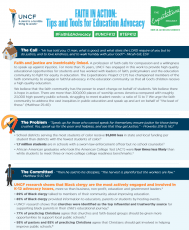 Faith in Action: Tips and Tools for Education Advocacy (2020)
Faith in Action: Tips and Tools for Education Advocacy (2020)
UNCF and The Expectations Project (TEP) teamed up to create a brief document that provides tips and tools to help clergy and leaders in the faith engage in educational equity issues. A profession of faith calls for compassion and a willingness to speak up against injustice. To learn more, please go to: uncf.org/faithedadvocacy
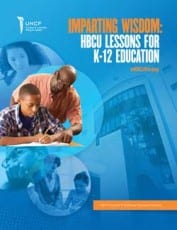 Imparting Wisdom: HBCU Lessons for K-12 Education (2020)
Imparting Wisdom: HBCU Lessons for K-12 Education (2020)
The report details historically black colleges and universities’ (HBCUs) longstanding efforts to provide quality educational experiences for their students and how their success may be translated in K-12 schools—specifically schools with demographics similar to HBCU populations.
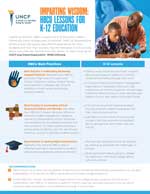 Summary: Imparting Wisdom (2020)
Summary: Imparting Wisdom (2020)
A one-page summary highlighting the results of the research.
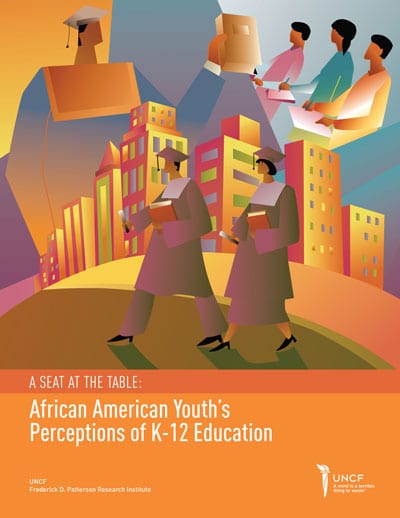 A Seat at the Table: African American Youth’s Perceptions of K-12 Education (2018)
A Seat at the Table: African American Youth’s Perceptions of K-12 Education (2018)
The role to be played by youth is just as important as that of leaders and parents. They are, after all, the stakeholders whose response to reform will determine if it succeeds or fails. Of the three groups, they are the only one with firsthand knowledge of what happens in the classroom. And, all too often, they do not have a seat at the table during reform discussions. This study, the third installment of UNCF’s African American perceptions research on key issues in K-12 education, begins to remedy that omission.
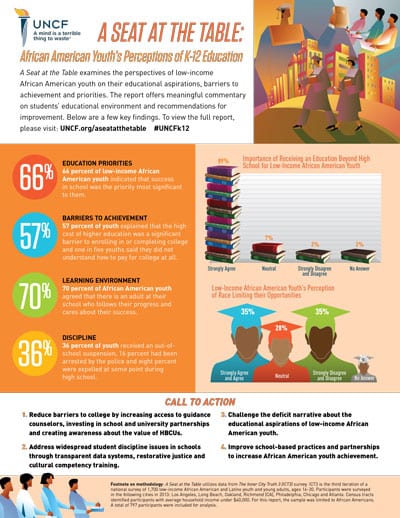 Infographic: A Seat at the Table: African American Youth’s Perceptions of K-12 Education (2018)
Infographic: A Seat at the Table: African American Youth’s Perceptions of K-12 Education (2018)
A one-page infographic highlighting the results of the research.
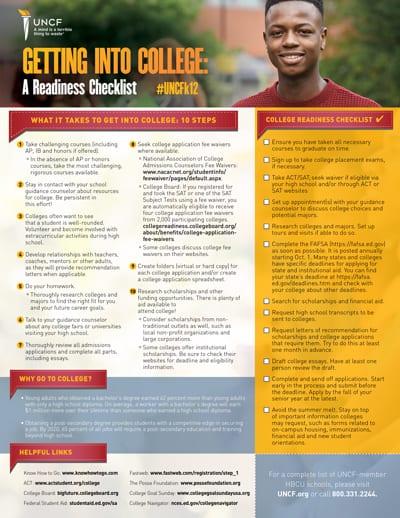 Getting into College: A Readiness Guide (2017)
Getting into College: A Readiness Guide (2017)
UNCF’s college readiness brochure provides a comprehensive college readiness checklist, outlines the pivotal steps in preparing for college, and shares additional websites and resources that are useful to students as they prepare for their post-secondary journey.
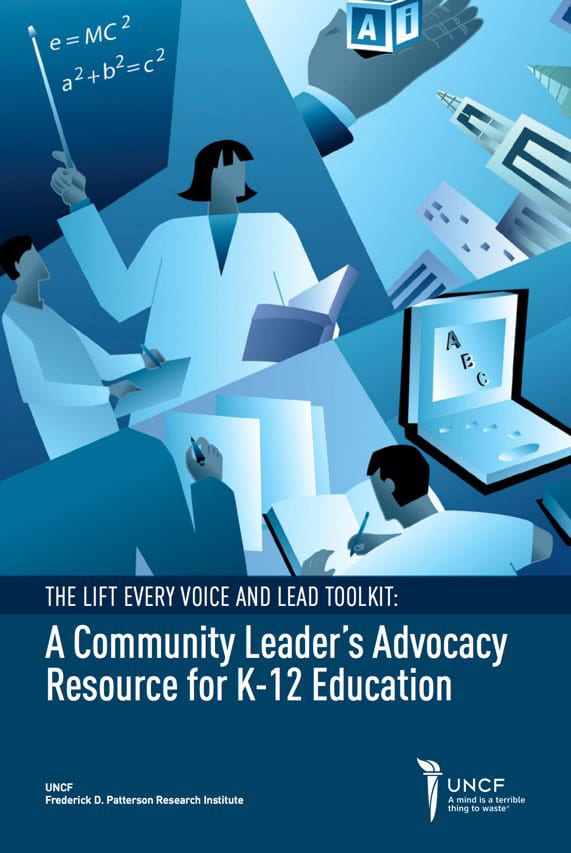 The Lift Every Voice and Lead Toolkit: A Community Leader’s Advocacy Resource for K-12 Education (2017)
The Lift Every Voice and Lead Toolkit: A Community Leader’s Advocacy Resource for K-12 Education (2017)
The Toolkit, a complement to “Lift Every Voice and Lead: African American Grasstops Leaders’ Perceptions of K-12 Reform”, provides tangible tips, strategies, talking points and resources to help grasstops who are serious about using their influence to make transformational change for all youth.
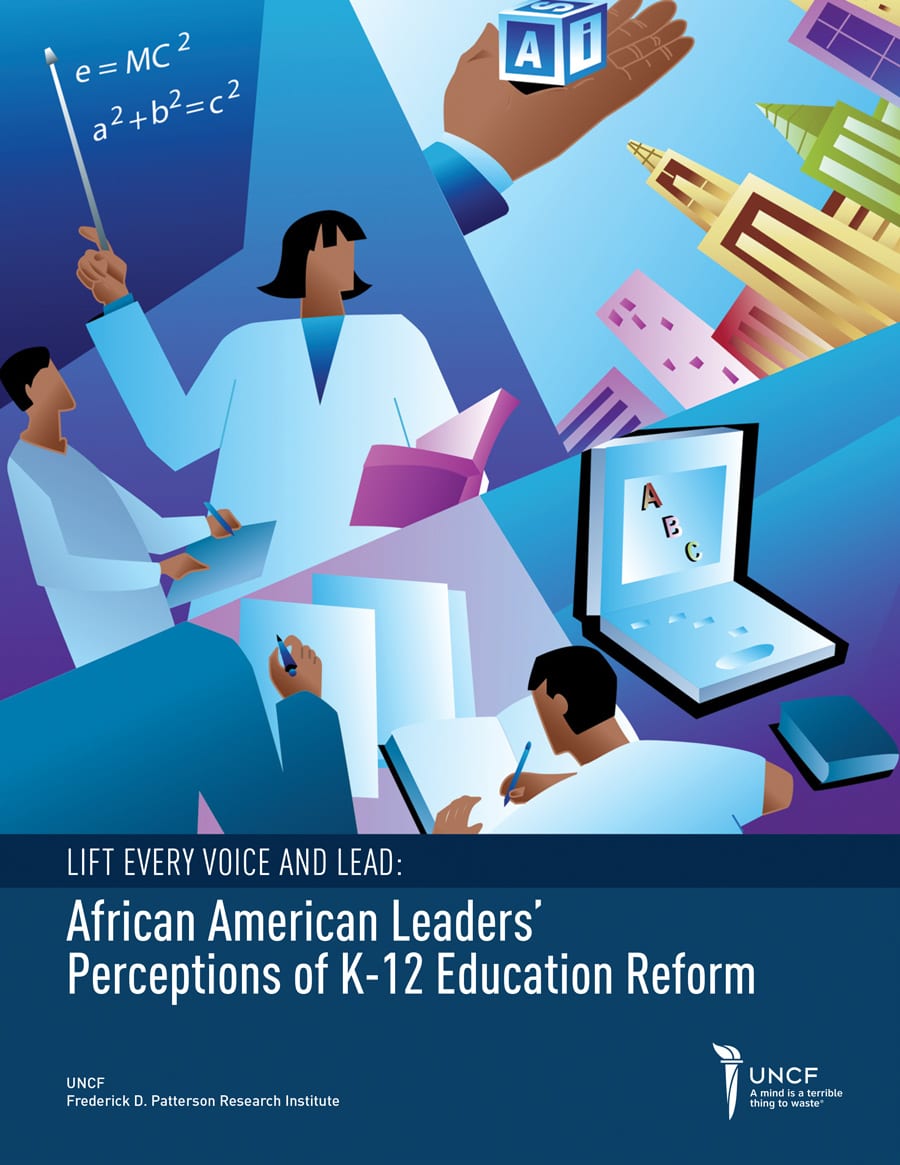 Lift Every Voice and Lead: African American Grasstops Leaders’ Perceptions of K-12 Education Reform (2017)
Lift Every Voice and Lead: African American Grasstops Leaders’ Perceptions of K-12 Education Reform (2017)
This report, issued by UNCF’s Frederick D. Patterson Research Institute (FDPRI), is an authoritative assessment of the potential for African American community leaders—a group of clergy, local politicians, business leaders and education leaders often described as “grasstops” to parallel community members at the “grassroots”—to garner support for K-12 public school reform. But, just as importantly, Lift Every Voice and Lead is a call to action for these leaders to help their communities exert their necessary influence on education reform.
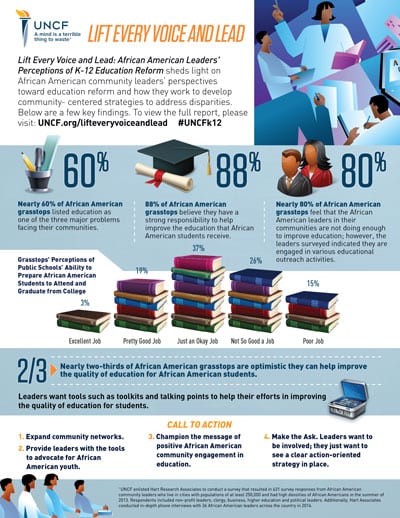 Infographic: Lift Every Voice and Lead: African American Grasstops Leaders’ Perceptions of K-12 Education Reform (2017)
Infographic: Lift Every Voice and Lead: African American Grasstops Leaders’ Perceptions of K-12 Education Reform (2017)
A one-page infographic highlighting the results of the research.
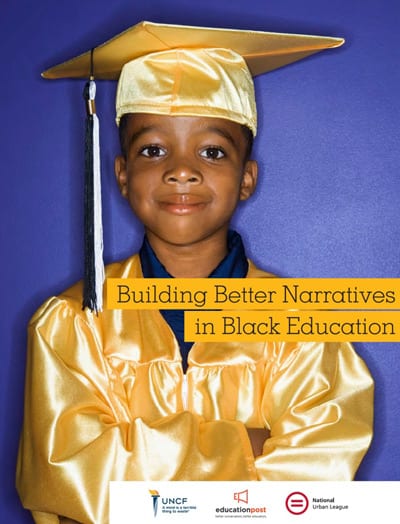
Building Better Narratives in Black Education (2016)
UNCF, the National Urban League, and Education Post produced this joint report, providing tangible approaches to shift the narrative concerning Black educational reform. The findings of the report aim to better engage communities around K-12 education and drive substantive policy changes for Black students.
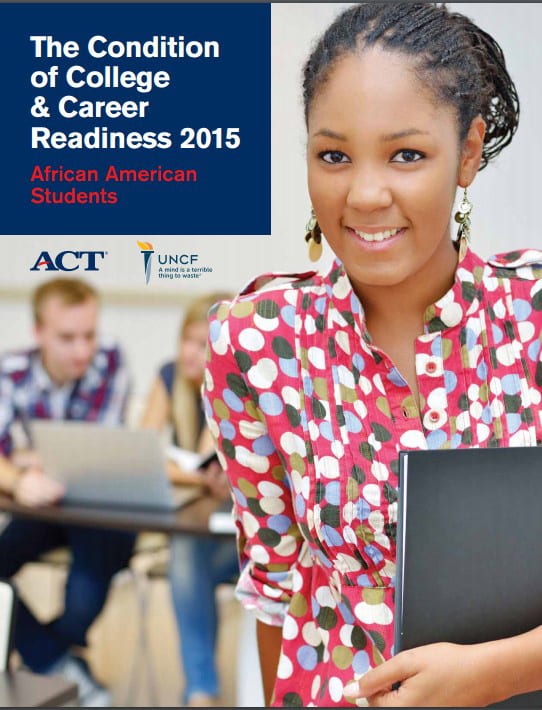
The Condition of College & Career Readiness 2015: African American Students (2016)
Are African American high school students prepared for college and careers? Are enough African American students taking core courses that will prepare them for college and careers? The UNCF and the American College Testing Program collaboratively released a report providing a national snapshot of the academic performance among African American students in the high school graduating class who took the ACT college readiness assessment.
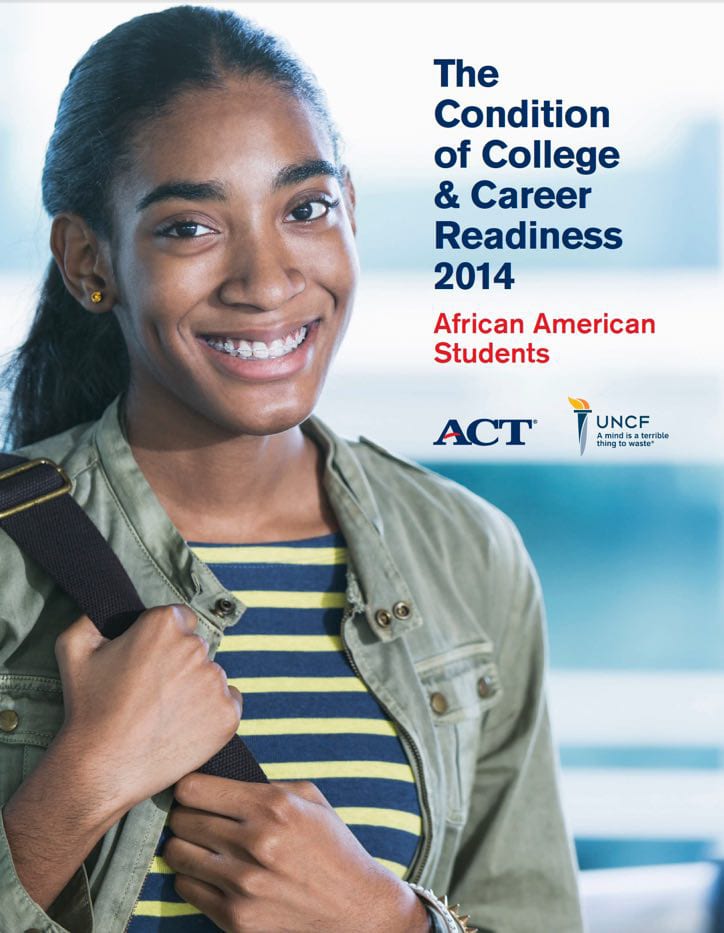 The Condition of College & Career Readiness 2014: African American Students (2015)
The Condition of College & Career Readiness 2014: African American Students (2015)
As the data in this report indicate, many African American students do well in school and important progress has been made in increasing educational attainment over the last several decades. But significant gaps remain between current levels of achievement and the more equitable levels of college and career readiness needed.
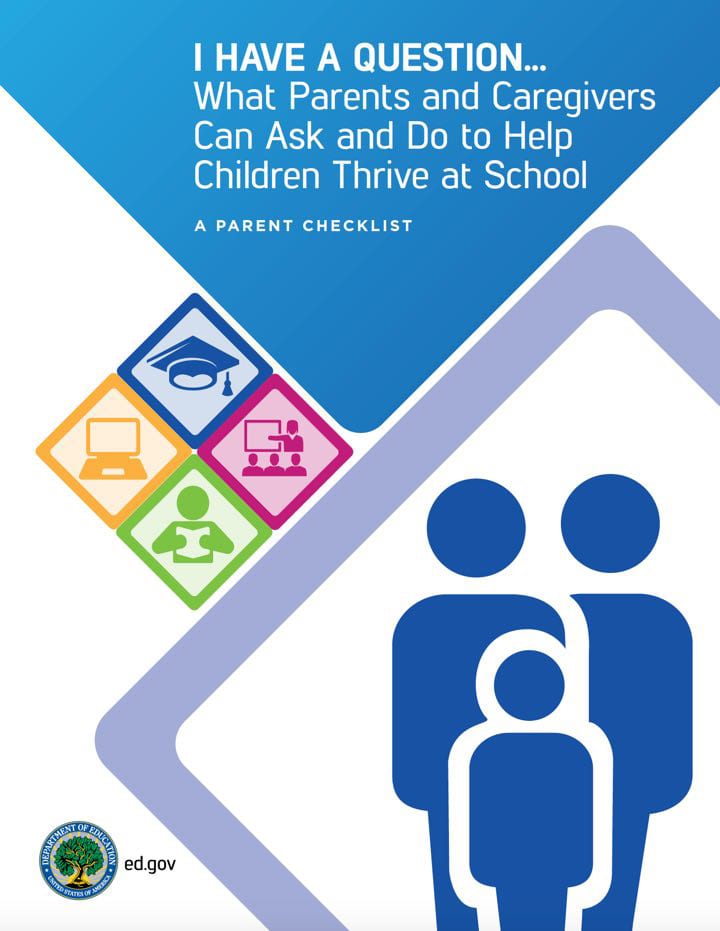 I Have a Question: What Parents and Caregivers Can Ask and Do to Help Children Thrive at School
I Have a Question: What Parents and Caregivers Can Ask and Do to Help Children Thrive at School
This tool provides you with a set of questions to ask, and important issues to consider when approaching your child’s teachers, principals and counselors about his or her development. As a parent or caregiver, it can be hard to know how to support your child’s learning, but asking your child’s educators the right questions is a good place to start.
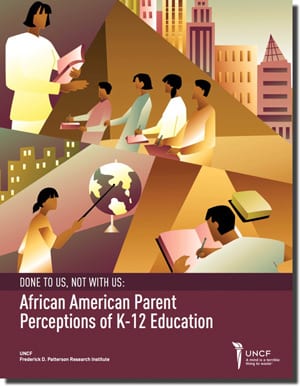 Done to Us, Not With Us: African American Parent Perceptions of K-12 Education (2012)
Done to Us, Not With Us: African American Parent Perceptions of K-12 Education (2012)
This publication explores how low-income African American parents view the K-12 education system and their role in supporting their children.
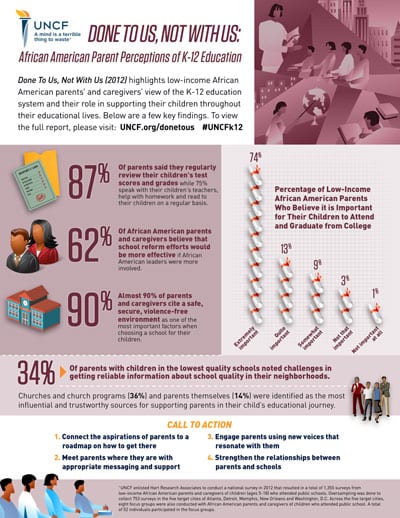 Infographic: Done to Us, Not With Us: African American Parent Perceptions of K-12 Education (2012)
Infographic: Done to Us, Not With Us: African American Parent Perceptions of K-12 Education (2012)
A one-page infographic highlighting the results of the research.
Institute for Capacity Building
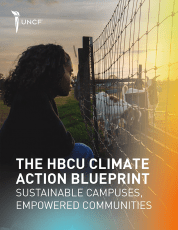 The HBCU Climate Action Blueprint: Sustainable Campuses, Empowered Communities
The HBCU Climate Action Blueprint: Sustainable Campuses, Empowered Communities
This report utilizes an eight-part framework to develop a foundational understanding of current climate and sustainability practices at HBCUs.
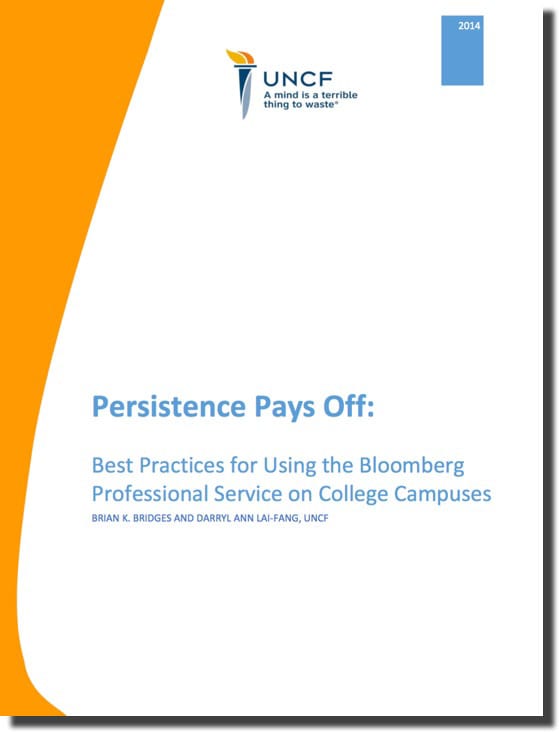
Persistence Pays Off: Best Practices for Using the Bloomberg Professional Service on College Campuses
This white paper documents the experiences of those institutions and lessons learned in integrating the Bloomberg Professional Service, commonly referred to as “Bloomberg terminals,” into their campuses and curriculum and identifies best practices in promoting greater usage.
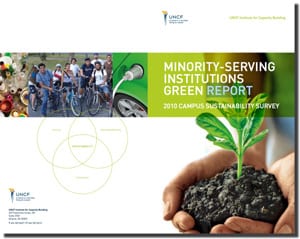
Minority-Serving Institutions Green Report (2010)
This MSI Green Report, the first to highlight MSI sustainability efforts, is designed to serve as a catalog of sustainability activities already underway at institutions founded to educate America’s historically marginalized groups. It will serve as a campus sustainability guide for students, parents, college administrators and others.
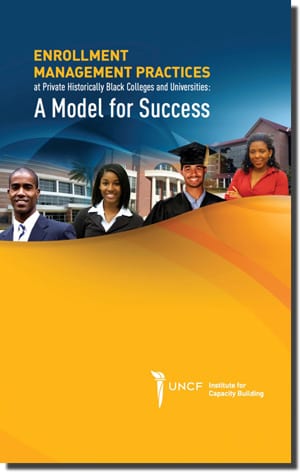
Enrollment Management Practices at Private HBCUs: A Model for Success (2011)
The purpose of this white paper is two-fold: First, to make the case that strategic enrollment management, properly designed and carried out, can be a catalyst for transforming American higher education. Second, to offer private HBCUs and other minority-serving institutions a model for success in enrollment management.
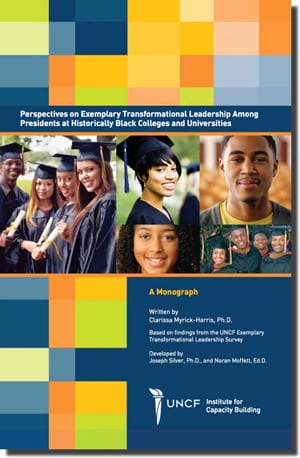 Perspectives on Exemplary Transformational Leadership Among Presidents at Historically Black Colleges and Universities (2014)
Perspectives on Exemplary Transformational Leadership Among Presidents at Historically Black Colleges and Universities (2014)
The survey and this publication represent aspects of a multi-pronged initiative to provide assistance to the leadership of private historically black colleges and universities (HBCUs) in the UNCF network. The initiative is based on the premise that stable, strategic and informed leadership, along with engaged and well-functioning governing boards, is essential for the continued viability and sustainability of any higher education institution.
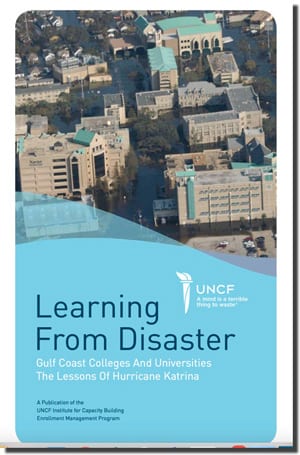
Learning From Disaster: Gulf Coast Colleges and Universities—The Lessons of Hurricane Katrina (2008)
More than a mere recording of events, this report is designed to be a practical tool kit —a checklist and a best-practices manual for colleges and universities across the country.